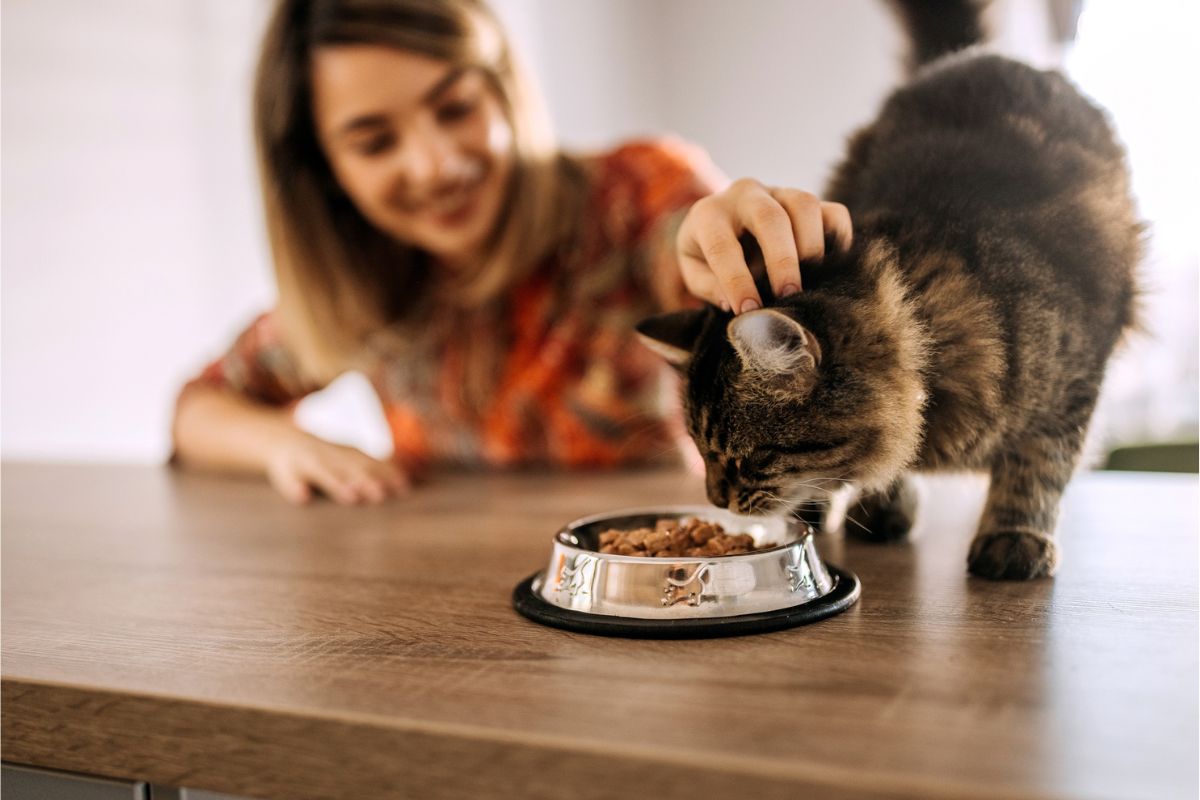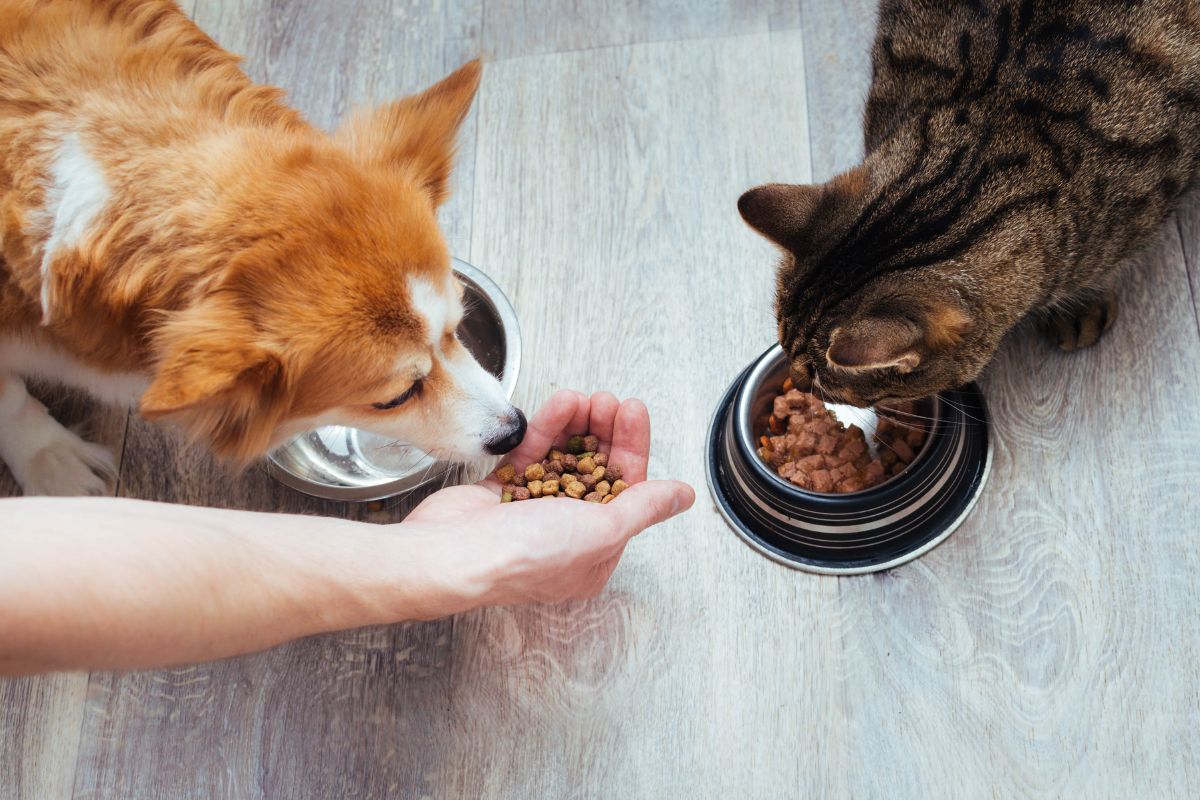Bringing a cat into your home isn’t just about cuddles and playtime. As a cat owner, it’s important to understand how to provide your feline friend with the best diet. From the playful kitten stage to the chilled-out senior era, knowing your cat’s nutritional needs at any age is crucial for their health and happiness.
Cat nutrition: the essentials
- Like humans and dogs, cats need a balanced diet to stay healthy. Proteins, carbohydrates, fats, vitamins, minerals and water are the key nutrients that keep our furry pals in top shape.
- Proteins are like the superheroes of your cat’s diet, keeping their muscles pumped and ready for any adventure. They love chomping on protein-packed goodies like chicken, turkey, fish, and beef, to give them strength to conquer the day.
- Carbohydrates give your kitty the oomph they need to stay lively and keep their tummies happy. Even though cats are all about meat, adding some carbs from grains, veggies or fruits can round out their diet nicely.
- Give your kitty’s fur that extra shine and glow with some healthy fats. Think of them as the secret ingredients for a purrfect coat. Omega-3 and omega-6 fatty acids are like magic potions, keeping their skin silky smooth and their immune system ready to tackle any bugs. Fish oil, flaxseed oil and even a bit of poultry fat are all fantastic sources to keep your furball looking and feeling fabulous.
- Vitamins and minerals are little powerhouses in your kitty’s body, making sure everything ticks along just right. They help with things like keeping bones strong, boosting the immune system, and even keeping your cat’s eyesight sharp. Mix up their meals with a variety of meats, organs and a sprinkle of supplements.
- Water is perhaps the most critical nutrient for cats, as they have a low thirst drive compared to other animals. Providing fresh, clean water at all times is essential for keeping your cat hydrated and maintaining proper kidney function.
Nutritional needs for each life stage
Ensuring your cat’s nutrition needs are met is essential for their overall health. Here’s why.
Quick links:
What should I feed my kitten? What should I feed my adult cat? What should I feed my senior cat?
What should I feed my kitten?
Kittens are bundles of energy, full of curiosity and playfulness as they explore their world. During this rapid growth phase, your kitten’s diet should be rich in protein, fat, vitamins and minerals to support their development.
Choose kitten-specific foods that provide higher levels of protein and essential nutrients tailored to their needs. These kitten foods promote healthy growth and development, strong muscles and bones, and a robust immune system.
Feeding frequency for kittens is more often than for adult cats, typically requiring three to four small meals a day to meet their energy needs. As they grow into adolescence their metabolism will begin to slow down – along with their rate of growth – and the number of meals can gradually decrease to twice per day.
What should I feed my adult cat?
Once cats reach adulthood, usually around 18 months of age, their nutritional needs stabilise. A balanced diet that maintains muscle mass, supports energy levels and promotes overall health is essential.
Look for adult cat formulas that provide a balance of proteins, carbohydrates and fats, along with essential vitamins and minerals. These formulas support optimal health and vitality throughout adulthood.
Adult cats typically thrive on a feeding schedule of 1–2 meals per day, with portion sizes adjusted to maintain a healthy weight. Providing a variety of protein sources and flavours keeps mealtime exciting for your adult cat.
What should I feed my senior cat?
As cats enter their senior years, usually around 7–10 years of age, their nutritional needs change once again. Senior cats may require fewer calories to maintain a healthy weight, but their need for certain nutrients, such as protein and joint-supporting supplements, may increase.
Switch to senior-specific cat foods designed to support aging bodies and promote joint health, cognitive function, and immune support. These foods contain lower calorie levels, higher levels of joint-supporting ingredients like glucosamine and chondroitin, and antioxidants to combat age-related cellular damage.
Senior cats may benefit from smaller, more frequent meals to accommodate their slower metabolism and potential dental issues. It’s recommended to feed senior cats two to three times a day, with portion sizes tailored to their size, weight, and activity level.
Choosing the right nutrition for cats: quality is key
When it comes to selecting the purr-fect food for your feline companion, quality is paramount. Look for cat foods that are complete and balanced, specifically formulated to meet their needs at every stage of life.
Super-premium cat foods are ideal, as they contain high-quality ingredients and are free from artificial additives and fillers. Seek out brands that prioritise the health and wellbeing of cats and have a reputation for producing nutritious foods.
Establishing healthy eating habits
Creating a positive mealtime routine is essential for keeping your cat’s appetite in check. Start with smaller meals for kittens and gradually transition to a feeding schedule that works for your cat’s lifestyle.
Interactive feeding tools, such as puzzle feeders or food-dispensing toys, add mental stimulation and slow down mealtime, preventing rapid eating and potential digestive issues.
Cats need to maintain a healthy weight
Keeping your cat at a healthy weight is crucial for their overall wellbeing. Regular exercise, portion control and a balanced diet are essential components of maintaining a healthy weight. Avoid feeding your cat table scraps or excessive treats, as these can contribute to weight gain and nutritional imbalances. Stick to feeding high-quality cat food and limit treats to occasional rewards.
Foods to avoid feeding your cat
Certain foods can be harmful or toxic to cats and should be avoided. These include chocolate, caffeine, alcohol, onions, mushrooms, garlic, grapes and raisins.
Additionally, avoid feeding your cat bones, as they can splinter and cause injury or obstruction in the digestive tract. Dairy products should also be given sparingly, as many cats are lactose intolerant and may experience digestive upset.
Ensuring your furry friend gets the nutrition they need at every stage of their life is the secret to keeping them purring with contentment at any age.
To help you navigate your cat’s healthcare journey at every stage of their life, book an appointment with your vet.








